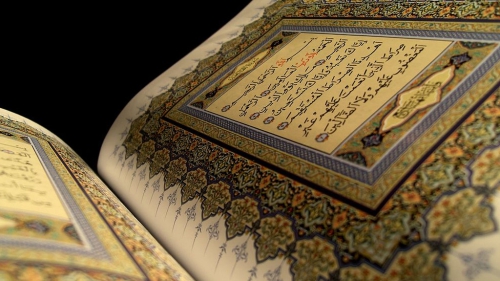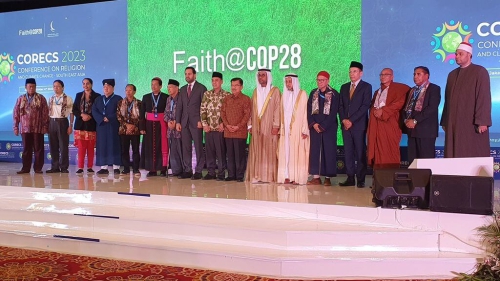Islamic Worldview and Islamic Vision

 |
Introduction
Belief in an unseen and unseeable God and answerability to Him is the core principle of the Islamic way of life. A believer's worldly life revolves around this basic understanding. And whatever he does, he is conscious that he will be rewarded or punished for it by God in the eternity of the Hereafter.
Thus Islamic worldview holistically integrates the life of this world with the life in the Hereafter. Therefore, in order to develop a right frame of mind and action, it is essential to clearly understand the worldview and the vision that Islam projects. Here, we will first briefly describe, and then present its supporting evidence from the Qur'an.
Islamic Worldview
According to the Islamic worldview, God created us humans as His Khulafa (plural of Khalifa), or His representatives on earth, and as such granted us a degree of autonomy - or will power and freedom to choose. In order that we could discharge this great responsibility of khilafah or representation, He endowed each of us appropriate faculties and a great potential to make use of these faculties. Thus we could advance civilization and achieve all that is good and beneficial for humankind.
However, this tremendous responsibility is given as an Amana, a Trust, for the discharge of which each and every one of us is accountable and answerable to God.
This accountability and answerability will take place at our resurrection in the eternity of the Hereafter. Then if a person is judged good by the Lord Almighty, his reward will be the abode of eternal happiness, peace and tranquility - the Jannah or paradise. But if he fails in his responsibility, he will be condemned to Hell and punished accordingly as he deserves. For these ultimate consequences, none else but God will be the only Judge - the Qur'an calls God the Wisest of Judges (Al Tin 95:8).
Islamic Vision
The Islamic vision tells us that our work should be directed for our falah - that is, our success or prosperity in this world as well as in the Hereafter. We will attain this success by being obedient to our Lord and Creator - for who knows us better, and knows what is better for us, than the one who created, manages and governs this entire universe.
Thus we should constantly seek the Rida or pleasure of God. For it is His pleasure that would turn the world we live in into a better place, and it is His pleasure that would ensure our place in Heaven in the eternity of the Hereafter.
All human problems ensue from man's disobedience to God. This, because all parts of a human body, just as all other objects in nature, function according to the divine commandments and laws. And only when a man's will functions in conformity with the rest of his body, he is at peace and attains the desired tranquility. However, when he is disobedient, he, in effect, rebels against his very nature, and it results in conflict within and schism without, leading to his failure.
Qur'anic Description of Islamic Worldview
As described earlier, the Qur'an states in several places that God created human as His Khalifa. For example: "Behold, your Lord said to the angels, I will create a Khalifa on earth" (Al-Baqarah 2: 30).
And He gave us the necessary faculties to discharge the responsibility of a khalifa. For example: "Say: "It is He who has created you (and made you grow), and made for you the faculties of hearing, seeing, feeling and understanding: Little thanks it is that you give" (Al Mulk 67:23).
To honor us, He blew some of His spirit into us: "But He fashioned him in due proportion, and breathed into him something of His spirit." (As-Sajdah 32:9). And although created out of the baser elements of earth, that is what imparts us nobler qualities and makes us the best of God's creation.
And He placed the nature at our disposal: "Do you not see that Allah has subjected to your (use) all things in the heavens and on earth, and has made His bounties flow to you in exceeding measure, both seen and unseen?" (Luqman 31:20).
However the entire honor of representation and all of the faculties are given to us as a trust. "We did offer the Amana (Trust) to the Heavens, and the Earth and the Mountains; but they refused to undertake it, being afraid thereof: But human undertook it - he was indeed unjust and foolish" (Al Ahzab 33:72).
We need to know that whatever we do during our worldly life is being recorded in detail by various means, and will all be presented on the judgment day in the Hereafter. Such as by two angels assigned to each and every one of us. (Angels are God's creation performing specific functions assigned to them). These angels are: "Kind and honorable - writing down (your deeds): They know (and understand) all that you do" (Al Infitar 82:11-12). Even by our own body parts: "That day We shall set a seal on their mouths. But their hands will speak to Us, and their feet bear witness, to all they did" (Ya Sin 36:65).
And we will be judged solely by God, He may punish or forgive whoever He wills: "To God belongs all that is in the heavens and on earth. He forgives whom He pleases and punishes whom He pleases: but God is Oft-Forgiving, Most Merciful" (Al-Imran 3:129).
Implications for the Human Conduct
Although the Islamic worldview is simple, yet it has profound implications for how we conduct ourselves, individually and collectively, while living in this world. It makes us cognizant of the fact that whatever we possess using the faculties and abilities bestowed by God is not actually ours and given us as a trust by Him. Therefore, we should be constantly checking ourselves, be aware and careful in how we acquire and use whatever we have. We should earn our living and its spending in righteous ways. Our means of earning are lawful and not harmful to us or others. We should avoid fraud, eliminate greed and corruption while acquiring and spending wealth.
For our dealings with others we must be honest, transparent, and just. As an example: "God does command you to render back your Trusts to those whom they are due, and when you judge between humans, that you judge with justice: Verily how excellent is the teaching which He gives you. For God is He who hears and sees all things" (Al-Nisa 4:58). Rendering of trusts could involve individuals or institutions which all must be adequately qualified and superbly meet the criteria for the work assigned to them.
The Qur'anic verse also refers to justice (further discussed in Chapter 10) as of paramount importance and must be observed under all circumstances without exception. Aspects of injustice that must be guarded against could also include oppression, unequal opportunities for individuals, highly skewed income and wealth distribution, opulence alongside poverty, and environmental degradation and resource depletion for future generations.
As God's trustees on earth we are equally responsible for the protection and preservation of earth and its resources. That involves taking care of its ecology, and all aspects of our environment. We should not misuse them, but use judiciously, as well as take care of all the waste and pollution caused by us.
Let's ponder for a while. It is this high level of consciousness that Islam imparts us in conducting all affairs in our individual and collective lives knowing that at the end we will be accountable and answerable for whatever we do. We are constantly asked to develop and internalize Taqwa or God-consciousness. No system of life other than Islam is capable of developing such human conscience.
For a Muslim, his endeavors in this world do matter very much, because on them depend the consequences of his life in the Hereafter. And for this, he/she constantly beseeches God: "Our Lord, Give us good in this world and good in the Hereafter, and defend us from the torment of the Fire!" (Al Baqarah 2: 201). According to a saying of the Prophet(p): "This world is the field for the crop of the Hereafter." Thus a true believer is very much engaged in this world, but stays away from all its enticements and ensnares.
Although belief in the Hereafter exists in both the Judaism and Christianity, there is no real concept of accountability. The former with its concept of chosen people, is concerned with here and now, and has no concept of answerability in the Hereafter. The latter with its concept of being forgiven simply for a belief in Jesus atoning for sins, absolves one of personal responsibility here, or in the Hereafter.
Secularism, which discards belief altogether, is purely materialistic and devoid of any higher values. And greed, corruption, and pursuit of hedonistic pleasures are responsible for human rot at its very core.
Right Guidance - the Way to Succeed and Prosper
At least in our five times daily Salat each and every time we stand up, we ask God: "Guide us on the straight path" (Al Fatiha 1:6).
The Qur'an provides answer to this request right thereafter in its next chapter - Al Baqarah, which also tells us that this guidance is the way to our Falah, prosperity and success, in this life as well as in the Hereafter.
This guidance is preceded with a statement about the Al-Kitab, the divine document available to us in the form of Qur'an that: "This is the Book, without doubt" (Al Baqarah 2:2). That is, this divine book is not based on doubts, speculations, and conjectures since it is from the One who is certain in His knowledge, and it is He who certainly determines the resulting outcome of our actions.
The Qur'an then describes six attributes of the rightly guided who would prosper and succeed here and in the Hereafter: "Those who are God-conscious, who believe in the Unseen, are steadfast in prayer, and spend out of what We have provided for them; and who believe in the revelation sent to you, and sent before your time, and have the assurance of the Hereafter. They are on true guidance from their Lord, and it is these who will prosper" (Al Baqarah 2: 2-5).
Therefore, 1, God-consciousness; 2, A belief in the realities beyond human perception; 3, Establishing a system of Salat (worship of God); 4, Contributing to collective welfare; 5, Acceptance of the divine guidance provided in the Qur'an, and of the previous scriptures as confirmed and corrected by the Qur'an; 6, A certainty of the Hereafter. These are the six elements for the right guidance, which would also cause prosperity and attaining success. These characteristics are variously emphasized at some 11 different places in the Qur'an. A quality particularly emphasized is to follow Muhammad(p), believe in him, and honor him (For example: Al-Araf 7:157).
Seeking God's Pleasure
The ultimate aim of all the endeavors of a believer is to seek the pleasure of God. In this life, it is apparent in his finding full spiritual and mental contentment, but the actual reward will be given to the deserving in the eternity of the Hereafter. That ultimate reward is that God will be pleased with such persons, and they will be pleased with Him. It is emphasized variously at in the Qur'an. Such as "God will say: 'This is a day on which the truthful will profit from their truth: Theirs are Gardens, with rivers flowing beneath - their eternal Home: God well-pleased with them, and they with God: That is the great Salvation' "(Al Maidah 5:119). Other places in the Qur'an where this is mentioned are: Al Tauba 9:100; Al Mujadilah 58:22; Al Bayyinah 98:8.
Let us pray that God, The Glorified and The Exalted make us among those worthy of this ultimate reward.
******
Siraj Islam Mufti, Ph.D. is a journalist and author. This article is taken from his forthcoming book "Islamic Dynamics" to be published in October, 2013. His other book "Muslims At The Crossroads", 2012 is available from Amazon.
Topics: Life Hereafter (Akhirah), Nature And Environment
Views: 18765
Related Suggestions
"islamic worldview and vision" has failed miserably; be it the Taliban
or Saudi Arabia, or the sharia courts in Nigeria and Somalia.
We should focus more on using Islamic values to better our lives
rather than imposing any sort of ideology on each other as well as
others.
Christian world vision, Jewish, !zorostrian, Hindu, Buddhist, Jain, Sikh and Animist
views. Is one better than the rest or should we consider all these expressions equally
true? I am sure the author has no answer!

















